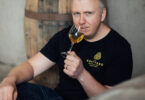Beannchor Bill
Bill Wolsey has come a long way from his disadvantaged Ballysillan beginnings in North Belfast. His company, Beannchor Ltd, enjoys a turnover approaching £20 million from direct on-trading and licensed trade leasing.
Bill began work toiling in London restaurants before returning home 30 years ago, using his parents’ £8,000 life savings coupled to his own amassed fortune of £2,000 to start off The Sportsman’s Inn in Bangor’s High Street.
As is evident from the standards in his pubs today, Bill has learned much down the years.
Beannchor manages nine of the 40 pubs itself but leases out the others, employing 200 directly and another 800 indirectly through the leased bars – among them The Garrick Bar, Muriel’s and the Lonely Poet.
“The leasing model has come about over a number of years as our business has grown. It has provided ambitious employees with the opportunity to take the next steps in running their own business,” says Bill, “We match the ex-employee with the appropriate licensed premises and carry out necessary refurbishment. We then provide them with support and direction to ensure the premises delivers a sustainable turnover for the tenant”.
Avoiding the easy option
Beannchor made a conscious decision to veer away from what it saw as the ‘easy option’ – targeting hen or stag parties or opening a ‘sports bar’.
“We own a number of leased premises that are in the same area of Belfast” admits Bill, “so it is important for us that the area is seen as safe and welcoming. We liaise closely with our tenants to ensure they are clearly focused on what the relevant target market is in each of their premises and aren’t tempted to cater for groups that may offer short-term financial benefits but will be detrimental in the long term.
“In many of our premises there are no gaming machines and Stags/Hens are not actively encouraged. We want venues and locations that people in Belfast are proud of.”
Beannchor therefore targets a much more mature audience.
Targeting a more mature market
“Before we open any new premises we consider the target market that we hope to reach. We hold a number of assets in our portfolio that cater to a more mature market. The décor and ambience within these premises is aimed at that specific socio-economic group and this has been very successful for us.”
I talk to local schools about our industry and about my experiences in business. I come from North Belfast, a heavily disadvantaged area, so I let them know that there’s a future for everyone who has the enthusiasm and passion to succeed.”
Advising tenants
He advises his tenants that there’s got to be a reason why people will leave home to come to their establishment so it’s not sensible to have TVs and gambling machines.
“Our success has been delivered around public houses that facilitate conversation, good food and interesting décor and we try and engender this sentiment with our tenants.
“We do our best to make sure they don’t slip into the mode of having a Karaoke Night or a Garth Brookes tribute band or some of the nonsense that publicans get themselves into such as having a price war etc. It’s about quality.”
As a multiple operator he’s seen people own two or three pubs but in effect, just opening the same pub two or three times.
“Van Morrison has made 18 albums. Some say he’s made the same album 18 times.,” he ruminates, “That’s a mistake for those who own more than one outlet.”
The group expanded considerably when it bought 15 pubs from KPMG, the administrator of MAR Properties, for a rumoured £10 million last year.
Trading in Belfast
He describes trade in Belfast over the past year as a mixed bag.
Pubs in the harder working class areas that historically have been wet-led have suffered from the smoking ban as clubs in their area have become less and less profitable and got into price-cutting.
 “City centre pubs that have understood their market and given the client a product that represents value-for-money are doing well,” believes Bill Wolsey..
“City centre pubs that have understood their market and given the client a product that represents value-for-money are doing well,” believes Bill Wolsey..
Planning the day
Depending on his day, he’ll go to one or two board meetings and will probably spend more time than most managing directors looking at the trading performance across the portfolio the previous day.
“I constantly review our existing portfolio and get heavily-involved in the design aspects so I spend a lot of time on ensuring that what we have is targeting the right market.
“I also make every effort to regularly visit all our premises in addition to looking at what the competition is doing.”
Half a day is also spent doing work with schools and colleges.
“I talk to local schools about our industry and about my experiences in business. I come from North Belfast, a heavily disadvantaged area, so I let them know that there’s a future for everyone who has the enthusiasm and passion to succeed.”
Visiting Dublin
As for moving to Dublin, he says he’s not taking on any Dublin pubs but hopes to open a Little Wing outlet there although trying to find the right site there has been difficult.
Still, his quest South taught him much.
“I spent one Wednesday recently trudging ‘round Dublin,” he recalls, “It’s funny but in a new city you see things in a different way. I think what was apparent to me was just how out-of-touch some publicans are with their clientele — and it could apply to any city. There are new, cleverer, small restaurants opening up who’re full at lunchtime while the pub beside them is offering food at a price that nobody wants to pay – and food that nobody wants to eat”.
He was in a burrito bar that was full and in a little restaurant with a good sandwich and tapas range, also full.
“… Then there was an ‘Oirish’ bar with about six customers in it.”
Another pub had been renovated about 10 years ago to make it a style bar.
“It wasn’t, it was a sad bar – and it was very empty,” he observes, “Publicans north and south are either going to have to be cleverer, more fleet-of-foot around the design or else the pub industry is going to die,” he concludes.
The dark pub with the stale smell of failure that doesn’t even offer pub classics but has tried to modernise its menu in a half-hearted way has virtually no appeal to anybody, he says.
And Bill’s visits to Dublin seem to have served merely to re-enforce that notion.








